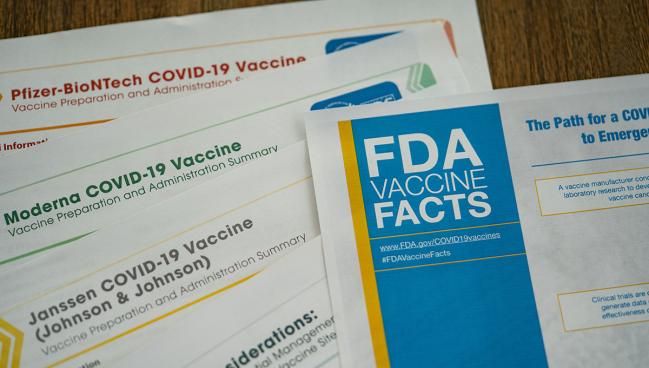FDA Updates CV Warnings Around COVID-19 mRNA Vaccines
Labels for the Pfizer and Moderna shots, which already caution about myocarditis and pericarditis, will more strongly stress risks.

The US Food and Drug Administration has approved new labeling for two mRNA COVID-19 vaccines (Comirnaty; Pfizer and Spikevax; Moderna) that emphasizes the risk of myocarditis and pericarditis.
The labels of both vaccines have long warned about the potential risks of this side effect, noting that the risk is highest in the first week following vaccination and more likely to affect males aged 12 to 24 years. The updated safety information will now include the estimated unadjusted incidence of myocarditis and/or pericarditis after administration of the 2023-2024 vaccines.
The new wording will state that the estimated incidence in the first week after vaccination is approximately eight cases of myocarditis and/or pericarditis per 1 million doses in those aged 6 months to 64 years. In males aged 12 to 24 years, the unadjusted incidence is approximately 27 cases per 1 million doses. The incidence is based on commercial health insurance claims data from inpatient and outpatient settings, according to the FDA.
Richard Kovacs, MD (Indiana University School of Medicine, Indianapolis), chief medical officer of the American College of Cardiology (ACC), said the updated label doesn’t tell physicians anything that hasn’t already been known for the last few years.
Nonetheless, “I think the more information that we have in the hands of prescribers, and cardiologists, the better,” he told TCTMD. “I think it was appropriate for the FDA to come forward at this time with the new [label]. It needs to be weighed against all of the other evidence that we’ve been gathering, and continue to gather, from both COVID-19 and vaccines in terms of effects on the heart.”
Additionally, the Moderna and Pfizer vaccine labels will include follow-up data about patients hospitalized with COVID-19 vaccine-associated myocarditis.
That information is derived from a longitudinal study of 333 patients who developed myocarditis after vaccination and who underwent cardiac magnetic resonance (CMR) imaging. In the study, the initial course of myocarditis was considered “mild” and most patients had favorable midterm outcomes, but more than 80% still had myocardial injury, as evidenced by the presence of late gadolinium enhancement, nearly 6 months after the diagnosis. The updated label will state the “clinical and prognostic significance of the CMR findings is unknown.”
Both Pfizer and Moderna are conducting long-term studies to assess the clinical impact of vaccine-associated myocarditis, according to the agency.
Kovacs said the longitudinal study cited by the FDA has inherent weaknesses, including the lack of adjudication around the imaging findings. While that study was necessary, “we need more organized approaches to this.”
The ACC is currently collaborating with Moderna to assess the risks of myocarditis using real-world data from electronic health records. Kovacs, who is the co-chair of that study, said they are methodically sifting through roughly 4,000,000 doses of the vaccine given to patients, the goal being to independently adjudicate cases of myocarditis on CMR and assess clinical outcomes in those who developed the complication.
“We know that both COVID and the vaccine can [cause myocarditis],” he said. “It’s a small number of patients, but what do we tell the patients with these small scars? What do we tell them is their future? How well can we predict that from the data?” That information, right now, is still unknown, he said.
Michael O’Riordan is the Managing Editor for TCTMD. He completed his undergraduate degrees at Queen’s University in Kingston, ON, and…
Read Full BioSources
Food and Drug Administration. FDA approves required updated warning in labeling of mRNA COVID-19 vaccines regarding myocarditis and pericarditis following vaccination. Posted on: June 25, 2025. Accessed on: June 26, 2025.





Comments